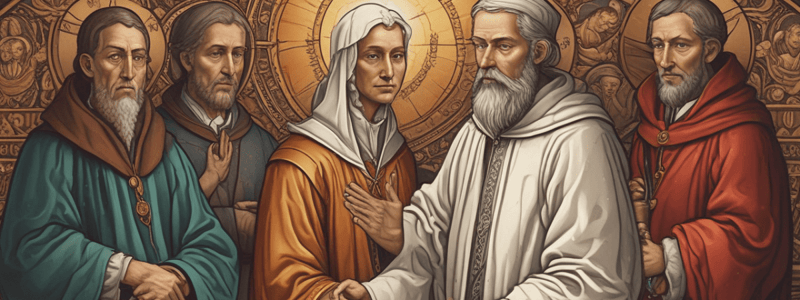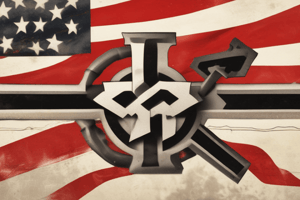Podcast
Questions and Answers
Luther knew the significance of his actions that led to the collapse of the medieval Christendom.
Luther knew the significance of his actions that led to the collapse of the medieval Christendom.
False (B)
The model of the Reformation portrayed in the content is considered false.
The model of the Reformation portrayed in the content is considered false.
False (B)
Foxe's Book of Martyrs is a historical account of the Protestant Church's persecution by the Catholic Church.
Foxe's Book of Martyrs is a historical account of the Protestant Church's persecution by the Catholic Church.
True (A)
The 'Trail of Blood' approach is an accurate method of tracing the true church throughout history.
The 'Trail of Blood' approach is an accurate method of tracing the true church throughout history.
The author suggests that the true church can be traced through theological means.
The author suggests that the true church can be traced through theological means.
The content portrays Luther as intentionally trying to collapse the medieval Christendom.
The content portrays Luther as intentionally trying to collapse the medieval Christendom.
The author is a Catholic and is defending the Catholic Church's legitimacy.
The author is a Catholic and is defending the Catholic Church's legitimacy.
The content suggests that the Protestant Church was the only true church throughout history.
The content suggests that the Protestant Church was the only true church throughout history.
Thomas Aquinas' work primarily focuses on the doctrine of God.
Thomas Aquinas' work primarily focuses on the doctrine of God.
Augustine's writings are not relevant to the speaker's tradition.
Augustine's writings are not relevant to the speaker's tradition.
Martin Luther's teachings are entirely positive and do not have a dark side.
Martin Luther's teachings are entirely positive and do not have a dark side.
The speaker's tradition is built solely on the work of Martin Luther.
The speaker's tradition is built solely on the work of Martin Luther.
The speaker's sermon on Martin Luther is intended to be critical of his views.
The speaker's sermon on Martin Luther is intended to be critical of his views.
The speaker believes that historical figures' strengths and weaknesses are unrelated to their character traits.
The speaker believes that historical figures' strengths and weaknesses are unrelated to their character traits.
The speaker only discusses Martin Luther's views on Jews in the context of the Holocaust.
The speaker only discusses Martin Luther's views on Jews in the context of the Holocaust.
The speaker's approach to understanding historical figures is primarily focused on their intellectual contributions.
The speaker's approach to understanding historical figures is primarily focused on their intellectual contributions.
Luther is considered the founder of the Reformed tradition.
Luther is considered the founder of the Reformed tradition.
The Amish and Mennonites are modern heirs of the Reformed tradition.
The Amish and Mennonites are modern heirs of the Reformed tradition.
The Lord's Supper was a minor issue in the 16th century.
The Lord's Supper was a minor issue in the 16th century.
Luther's teachings did not influence the Christological debate.
Luther's teachings did not influence the Christological debate.
The issue of church and state was not a major concern in the 16th century.
The issue of church and state was not a major concern in the 16th century.
Justification was not a central doctrine in the Reformation.
Justification was not a central doctrine in the Reformation.
The content suggests that Luther was not a key figure in the Reformation.
The content suggests that Luther was not a key figure in the Reformation.
The Reformation was a time of relative peace and stability in Christian history.
The Reformation was a time of relative peace and stability in Christian history.
Luther is seen as a helpful paradigm of evangelical experience.
Luther is seen as a helpful paradigm of evangelical experience.
The Annotated Luther series consists of three volumes.
The Annotated Luther series consists of three volumes.
Luther is present in the word proclaimed, baptism, and the Lord's Supper.
Luther is present in the word proclaimed, baptism, and the Lord's Supper.
The Annotated Luther series is a cheap and affordable resource for pastors.
The Annotated Luther series is a cheap and affordable resource for pastors.
The speaker suggests that Luther's teachings are entirely positive and do not have a dark side.
The speaker suggests that Luther's teachings are entirely positive and do not have a dark side.
The content suggests that the speaker's tradition is built solely on the work of Martin Luther.
The content suggests that the speaker's tradition is built solely on the work of Martin Luther.
The speaker is critical of Luther's views on baptism and the Lord's Supper.
The speaker is critical of Luther's views on baptism and the Lord's Supper.
The Annotated Luther series is a collection of Luther's minor writings.
The Annotated Luther series is a collection of Luther's minor writings.
According to Niall Ferguson, applied history involves studying the past to understand the human condition.
According to Niall Ferguson, applied history involves studying the past to understand the human condition.
The church's Christology and incarnation can be fully understood by only reading the Bible.
The church's Christology and incarnation can be fully understood by only reading the Bible.
The author's approach to understanding the past involves reading the Bible alone.
The author's approach to understanding the past involves reading the Bible alone.
The author's first church history course at Westminster focuses on modern church history.
The author's first church history course at Westminster focuses on modern church history.
The author believes that the Bible is not supremely authoritative in Christian theology.
The author believes that the Bible is not supremely authoritative in Christian theology.
Understanding the church's historical development is unnecessary for a full-orbed Christology.
Understanding the church's historical development is unnecessary for a full-orbed Christology.
The author's approach to history is primarily focused on understanding the economic influences of the past.
The author's approach to history is primarily focused on understanding the economic influences of the past.
The author believes that the 'inspired example' way of reading history is entirely flawed.
The author believes that the 'inspired example' way of reading history is entirely flawed.
Study Notes
Understanding the Reformation
- Martin Luther's work led to the collapse of the doctrine of the church, forcing its rebuild in a new form.
- Luther's actions, though unintentional, brought about the death of late medieval Christendom.
Reformation Models
- The traditional model of the Reformation focuses on the "Trail of Blood," tracing back martyrs through history to establish the legitimacy of the Protestant Church.
- A more effective approach is to trace the true church theologically, focusing on Augustine and Pauline views of grace, Trinitarian, and incarnational theology.
- This model allows Protestants to claim Catholic theologians like Thomas Aquinas and Augustine as part of their tradition.
Luther's Significance
- Luther pressed medieval theology to its limits, causing its collapse and rebuild in a new form.
- Luther's work led to the death of late medieval Christendom and brought about the Reformation.
- He is the founder of one of the two great Protestant traditions, the Lutheran tradition.
- Key debates of the Reformation, such as the Lord's Supper, justification, and church and state, had their terms set by Luther.
Luther's Strengths and Weaknesses
- Luther's strength and weakness are functions of the same character trait.
- He had a dark side, with some versions of his anti-Semitic views leading to the Holocaust.
- Despite this, Luther is seen as a positive force in history.
Applied History
- Applied history involves digging into the past to understand why people acted in certain ways at particular points in time.
- This approach helps understand the human condition and why the church thinks the way it does.
The Importance of Church History
- Church history is essential for understanding why the church thinks the way it does.
- Reading the works of historical theologians can help us learn from their struggles and insights.
- The Lord's Supper was a crucial issue in the 16th century, with more ink spilled and lives lost over it than any other doctrine.
Studying That Suits You
Use AI to generate personalized quizzes and flashcards to suit your learning preferences.
Related Documents
Description
Explore the significance of Martin Luther's actions on medieval theology and Christendom, and how it led to the Reformation.




